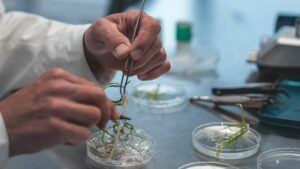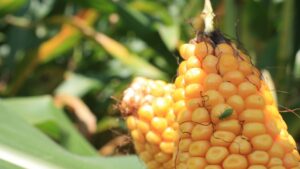PEOPLE NEWS
Monsanto Company’s board of directors has appointed Pierre Courduroux as the company’s new senior vice president and chief financial officer. Courduroux most recently served as Monsanto’s finance lead for its global business operations. Prior to that, he served as the chief financial officer for Monsanto’s global vegetable business.
Advanta has appointed Quinton Joe Raab as global plant breeding lead of field crops and corn crop research. Raab has 20 years of experience in breeding, technology management and licensing work with Monsanto Company. Raab will lead Advanta’s planning and implementation of breeding strategies in field crops and research activities in corn.
Chromatin Inc. has announced the addition of Jeff Widder to its executive team as vice president of seeds. Widder will oversee the company’s seed production, sales, marketing and distribution activities at its subsidiary, Sorghum Partners LLC.
Asha Lundal has joined The Context Network as a senior associate. Lundal’s portfolio includes experience in the seeds and traits commercial business, biotechnology strategy and operations, and a thorough history in deal structure, negotiations and post-transaction integration. Industry veteran Glenn Stith has also been named a senior associate for the company. Stith’s career has focused on developing and implementing effective business strategies in seed, crop protection, row crop and vegetable segments.
Pioneer Hi-Bred, a DuPont business, has announced two new leadership positions. Alejandro Munoz has been named vice president of Americas Group and Global Production, with commercial business responsibility for the United States, Canada and Latin America regions, as well as global responsibility for seed production and safety/risk management. Judd O’Connor has been named vice president and regional director for the United States. He will be responsible for Pioneer’s operations within the six business units in the United States, and also PROaccess Genetics.
PRODUCT NEWS
Bayer CropScience LP has finalized a licensing agreement with Heads Up Plant Protectants Inc. for access to the company’s Heads Up seed treatment. “When applied to soybean seed, Heads Up triggers the crops’ defense systems against diseases upon germination,” says Bayer product development manager Jennifer Riggs. “When used with seed-applied fungicides, Heads Up brings an additional mode of action to protect young soybeans from soil diseases that are present in the environment when soybeans are traditionally planted.”
Advanced Biological Marketing has announced the next generation in seed treatments—iGET (Induced Gene Expression Triggers). The technology, now formulated into several new products for ABM, alters plant gene expression to change plant physiology and enhance biochemical pathways that will increase crop performance. “These changes are systemic,” says Marty Robinson, ag division president, “so that root colonization by the seed treatment can affect the physiology of the whole plant, even the foliar or leaf biology. It will enhance the uptake of water, nutrients, especially nitrogen and subsequent nutrient metabolism.” ABM offers iGET products for corn, soybeans and wheat.
INCOTEC has announced a new yield accelerator called GeniusCoat, a novel blend of specific humic and fulvic acids incorporated in a specially developed film coat formulation for use on cereals. The balanced level of humic substances enhances crop nutrition by influencing the water-retaining capacity of the soil and stimulating root development, which potentially increases yield. GeniusCoat gives cereal plants a robust root development, making the plant better equipped to exploit the soil’s natural resources.
Chemtura AgroSolutions has introduced two new Rancona seed enhancements formulated for soybeans. Available in a concentrated commercial formulation—Rancona 3.8FS—and a ready-to-use, easy-to-apply formulation—Rancona Summit—these enhancements provide growers with the opportunity to maximize stand emergence and uniformity, leading to greater soybean yield potential. The systemic properties have also been proven to control soil-borne diseases, including Rhizoctonia, better than competitive seed treatments, leading to higher yields.
BUSINESS NEWS
Bayer CropScience AG and Evogene Ltd. have entered into a five-year collaboration to accelerate the development and introduction of improved wheat varieties. Improvements will be pursued for wheat yield, drought tolerance, fertilizer use efficiency, and certain other wheat traits, utilizing a combination of advanced breeding and genetic modification methods. Bayer will have exclusive rights to commercialize wheat traits resulting from this collaboration.
Syngenta and DuPont have announced that Syngenta will grant DuPont business, Pioneer Hi-Bred a non-exclusive, global license to its corn rootworm trait MIR604 (Agrisure) for corn seed. The trait provides protection from below-ground coleopteran insects, including corn rootworm, a major corn pest in the United States. The license gives Pioneer full stacking rights of MIR604 with other traits. “This rootworm trait provides additional product options for our customers, continuing our momentum in the marketplace,” says Paul Schickler, Pioneer Hi-Bred’s president.
INCOTEC and FBSciences Inc. have reached an agreement on basic terms for a global partnership to test, develop and commercialize new seed treatment and coating technologies for the seed industry. Under the agreement, FBSciences’ active ingredients for seed treatment will be combined with INCOTEC’s seed coating and application technologies as pre-mixed packages to be marketed to growers for use in field crops, ornamentals and vegetables. Incotec will be responsible for marketing and distributing these pre-mixed product packages to the global seed industry as part of the agreement.
Illinois Foundation Seeds Inc., a research, product development and licensing company serving both the dent and sweet corn industry, has made a strategic investment in Floragenex, a genomics technology firm. As part of the agreement, IFSI will gain access to Floragenex’s technology for their research and breeding efforts in the dent and sweet corn markets.
FBSciences Inc. has contracted the research and development of its proprietary plant growth regulator technologies for seed treatments and crop protection products to AgriThority LLC. AgriThority has field and lab research underway in the United States, Canada, Germany, Argentina, Brazil, Australia and India, and is consulting on research in China. PGR technology has demonstrated an ability to influence key genetic responses, improving plant health and productivity in a wide variety of agronomic crops. FBSciences anticipates registration of the new technology by the U.S. Environmental Protection Agency in the second quarter of 2011.
Novozymes has completed its acquisition of EMD/Merck Crop BioScience. “We’re excited to bring these two innovative companies together to help farmers produce more and better food, feed, fuel and fiber while minimizing the environmental footprint,” says Thomas Videbaek, executive vice president of Novozymes. Novozymes’ biofertility products increase the supply of nutrients to crops, and include nitrogen inoculants for legume crops, signaling compounds to enhance nitrogen fixation, and products that increase the availability of phosphate to crops.
Monsanto Company has acquired Divergence Inc., a privately-held St. Louis-based biotechnology research and development company. Divergence’s current focus is its work with parasitic nematodes, including developing biotechnology traits for nematode control and nematicides with novel modes of action and superior safety profiles.
Wilbur-Ellis Company has purchased the assets of Agri-Services, which offers a full-line of agronomy services and products primarily for corn, soybeans and wheat. The acquisition will expand Wilbur-Ellis’ footprint in the Great Lakes region, where it already has significant presence.
BASF and Monsanto Company have announced a new agreement to collaborate on the advancement of dicamba-tolerant cropping systems. The companies have granted reciprocal licenses, and BASF has agreed to supply formulated dicamba herbicide products to Monsanto. The agreement will facilitate further development work and subsequent commercialization of a dicamba-tolerant system, which includes innovative dicamba formulations proprietary to BASF and the dicamba-tolerant trait for soybeans, which is proprietary to Monsanto. The system is expected to be introduced in the United States and Canada in the middle of the decade, pending regulatory approvals.
Bayer CropScience has entered into an agreement to purchase Hornbeck Seed Company Inc., a privately-held company headquartered in DeWitt, Ark. Hornbeck supplies soybean, rice and wheat varieties in the southern U.S. market, with an in-house soybean breeding program and proprietary soybean germplasm. Bayer will acquire the seed businesses and gain access to quality soybean germplasm for future variety and trait development. Bayer’s proprietary traits will be introgressed and commercialized via Hornbeck’s soybean germplasm base and high-quality breeding program.
Bayer CropScience and KeyGene have entered into an exclusive trait development agreement. Both companies will combine their expertise in the fields of protoplast technology and targeted molecular mutagenesis to create novel traits for crop improvement. The collaboration will initially focus on the use of KeyGene’s new and proprietary KeyBase methodology to develop innovative traits for new oilseed rape varieties. Bayer also has the option to expand the trait development alliance to include KeyBase-mediated development of proprietary Bayer and/or KeyGene traits in cotton and rice.
Syngenta and Bayer CropScience have formed a co-development agreement on an HPPD herbicide tolerance trait for soybeans. The trait is in early development, with a launch in North America expected in the second half of this decade. By incorporating tolerance to HPPD herbicides, and thereby enabling the use of leading weed control products, the new trait will provide a powerful mode of action for weed control and management of weed resistance, particularly to glyphosate. The trait will have significant potential for out-licensing, as well as in the companies’ respective branded seeds businesses.
INDUSTRY NEWS
A recent licensing agreement between NUtech Ventures and Bayer CropScience AG will focus on wheat improvement. The agreement makes US$2 million available for an endowed professorship at the University of Nebraska-Lincoln. It also includes support for UNL research and education programs, and plans for the company to establish its first North American wheat breeding station near Lincoln. “This agreement will allow both Bayer and UNL to improve their respective wheat breeding programs, while preserving both parties’ ability to collaborate with other companies and universities,” says David Conrad, director of NUtech Ventures.
The Plant Sciences Group of Wageningen UR University and Research Centre and Biogemma have announced a collaboration in research and development of drought-tolerant wheat. “With the ever-increasing emphasis on limiting water use and predicted increasingly dry summers, it is essential to improve this aspect in our main crops. The license agreement with Wageningen allows us to reinforce our wheat trait portfolio with a number of drought tolerance genes,” says Pascual Perez, chief executive officer of Biogemma.
Purdue University researchers have found a genetic mutation that allows a plant to better endure drought without losing biomass; a discovery that could reduce the amount of water required for growing plants, and help plants survive and thrive in adverse conditions. Mike Mickelbart, an assistant professor of horticulture; Mike Hasegawa, a professor of horticulture; and Chal Yul Yoo, a horticulture graduate student, found that a genetic mutation in the research plant Arabidopsis thaliana reduces the number of stomata. But instead of limiting carbon dioxide intake, the gene creates a beneficial equilibrium. “The fewer stomata still allow for the same amount of carbon dioxide intake as a wild type, while conserving water,” says Mickelbart, whose results were published in the online version of the journal, The Plant Cell. “This shows there is potential to reduce transpiration without a yield penalty.”
Researchers at Colorado State University will participate in a five-year, $25 million United States Department of Agriculture project addressing the impact of climate change on wheat and barley. Over the five-year period, CSU researchers in the Department of Soil and Crop Sciences will receive $608,000 for the Triticeae Coordinated Agriculture Project. One of their major tasks is the evaluation of 300 lines of winter wheat for yield, drought tolerance and nitrogen-use efficiency in four different environments. These efforts will be coordinated with similar trials in Nebraska, Kansas, Oklahoma and Texas.
An improved molecular tool for precisely modifying DNA in living cells could allow researchers to better introduce genes for disease resistance in crops. Technology co-developed by researchers at Iowa State University and the University of Minnesota now makes these kinds of advances possible. The technology, called TAL effector nucleases, removes the guesswork from DNA targeting, allowing researchers to make modifications at virtually any place in a genome. Cellectis recently signed an exclusive license agreement with University of Minnesota and Iowa State granting the company worldwide rights to use and market TAL effector nucleases. Scientists at Minnesota and Iowa State have a patent pending on the technology.
Industry News is geared to seed professionals and delivers the people, industry, business and product news you need to know. Submissions are welcome. Email us at news@issuesink.com












